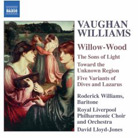April 2006
Willow-Wood is a cantata based on texts from Dante Gabriel Rossetti’s House of Life. It is scored for baritone soloist, women’s chorus, and orchestra and is in the composer’s best mystical style. The Voice Out of the Whirlwind is based on the Bible’s Book of Job, so it no surprise to find that it was written at the same time as Job, the composer’s masque with dancing. In fact, the main theme of this brief motet for chorus and orchestra is one of those jolly English tunes lifted straight from the larger composition. The Sons of Light is a cantata for chorus and orchestra dealing with the Zodiac and Creation and reminds one of the composer’s gigantic A Pilgrim’s Progress. The performances of all these pieces are idiomatic, astute, and compelling. The recorded sound is quite good, being rich, full, and spacious. The very highest sounds, cymbal clashes and upper woodwind seem just a mite dull, but the bass is solid without being overbearing. Overall, a lovely collection of pieces that are seldom heard yet sound somewhat familiar due to being composed in tandem with more famous compositions. GO BACK TO: |
 Vaughan Williams -
Toward the Unknown Region; Willow-Wood; The Voice
out of the Whirlwind; Five Variants of Dives and Lazarus; The
Sons of Light
Vaughan Williams -
Toward the Unknown Region; Willow-Wood; The Voice
out of the Whirlwind; Five Variants of Dives and Lazarus; The
Sons of Light